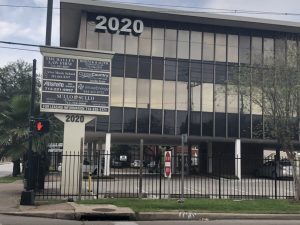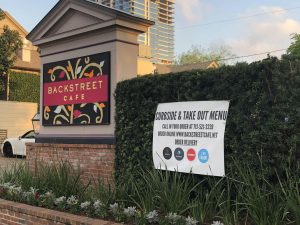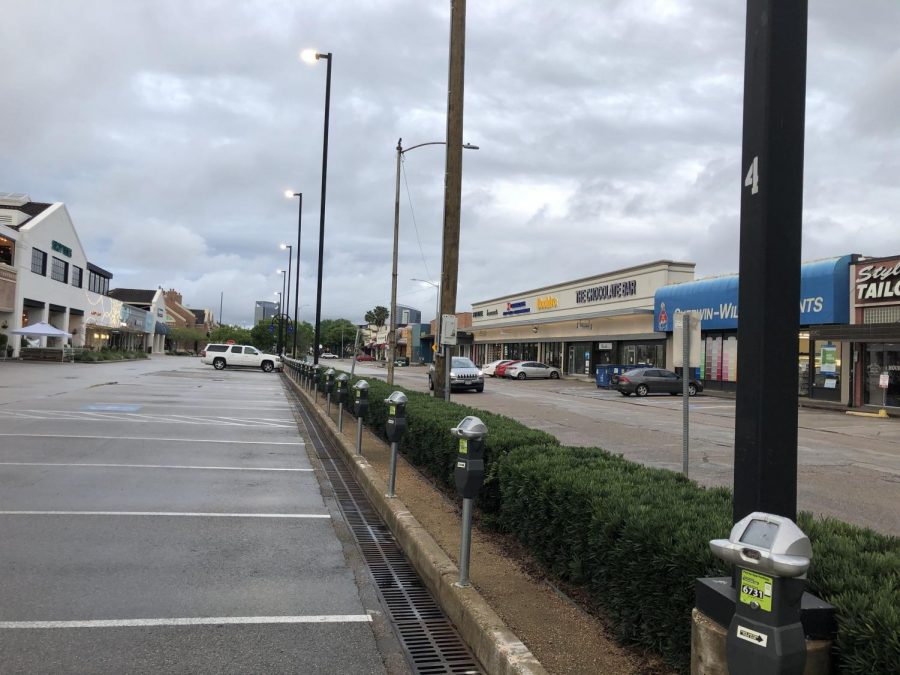Businesses follow CDC guidelines, adapt to stay-at-home orders
Rice Village parking lots, stores and restaurants are empty while Houstonians stay at home due to COVID-19.
March 30, 2020
Streets are deserted and commercial parking lots lie vacant as businesses across Houston shut their doors in response to the COVID-19 pandemic. The city of Houston, normally bustling with life, is eerily silent.
Even before the number of COVID-19 cases in Houston hit double digits, business owners were preparing to “weather the storm” and lessen the impact of the outbreak.
Senior Julian Westerfield’s mother, Daria, is a co-owner of River Oaks Travel. As soon as she read about the tens of thousands of COVID-19 cases in Italy, one of her clients’ most popular destinations, Daria realized that the pandemic’s spread to the United States was inevitable. Drawing from her experiences from living in the “collapsing system” of the Soviet Union, she began to formulate contingency plans.
“When I looked at Italy and understood what was going on, as a businessperson, I realized that it would hit us as well,” Daria said. “We looked at our business and immediately calculated what we needed to do in terms of staying afloat.”
Daria’s travel agency is one of countless businesses affected by COVID-19, which has forced entire industries, particularly the service industry, to curtail or cease operations. On March 24, Harris County issued a stay-home-work-safe order, which closed all businesses not part of an essential industry until April 3.
Tracy Vaught (’73) owns four restaurants in Houston: Backstreet Café, Hugo’s, Caracol and Xochi. COVID-19 has placed her in an “unprecedented” and “unbelievable” situation, forcing her to temporarily close Caracol and Xochi, stop all in-person dining at Backstreet Café and Hugo’s and lay off nearly 400 employees. Only a “skeleton crew” consisting of the highest-payroll employees remain.
“We’re so people-heavy, there’s no way to keep everyone on,” she said. “The whole restaurant industry is laying off people by the thousands.”
Vaught has never experienced such a challenge in her 36 years as a restaurateur.
“The reason the current situation is so challenging is because there’s no end in sight,” she said. “Unlike the aftermath of Hurricane Harvey, insurance does not cover a pandemic.”
For Daria’s travel agency, the pandemic has arrived at an especially pressing time. According to Daria, spring break is the agency’s busiest time of year because clients make reservations for summer vacations en masse. Due to COVID-19, however, none of those vacations will take place as scheduled. To limit the spread of the virus, River Oaks Travel released a message asking customers to refrain from travel.
“It hurt us to make the decision—not one part of my business was unaffected,” Daria said. “Now, instead of planning vacations for excited customers of all ages, we are talking to clients about cancellations or rebooking.”
Although two of Vaught’s restaurants remain open, revenue garnered by her restaurants has fallen by 88 percent due to limited operations. Faced with the challenge of plummeting profits, she has found unorthodox solutions.
“We started offering mixed cases of wine for 40 percent off at Backstreet Café, our menu at each location is heavily discounted and we added breakfast tacos and family-style dishes to our menu,” Vaught said. “The name of the game is to adapt, so we’re doing all kinds of things that are innovative and interesting under a lot of hardship.”

Josh Pesikoff (’87), CEO of Infuse Energy, has set up a virtual workplace to encourage social distancing.
Businesses outside of the service industry have also made adjustments to their daily operations. Even before the stay-home-work-safe order took effect, business owners began moving their operations away from the office.
Josh Pesikoff (’87), the president and CEO of Infuse Energy, sells electricity plans to customers in deregulated regions of Texas, including Houston. Over the last couple of weeks, his business has prepared a virtual office that allows employees to work from home.
“As of now, all employees are working from home,” he said. “We will remain this way for the foreseeable future.”
While Pesikoff’s company has successfully transitioned to remote operations, other businesses, having faced mass layoffs and revenue plunges, have not been so fortunate. In response, Infuse Energy has stepped in to help customers laid off from the businesses that have borne the brunt of the onslaught.
Finding themselves suddenly without income, several of Pesikoff’s customers contacted him to ask for an extension on their monthly electricity plans. When considering their requests, Pesikoff balances being “very generous about payment plans” with requiring that customers pay their bills in order to keep Infuse Energy afloat. He has granted as many extensions as the business is able to fund, but extensions cannot last for an unlimited time.
“At a certain point, we have to draw the line because I do need to pay my employees,” Pesikoff said.
Although Infuse Energy has tackled challenges posed by the pandemic thus far, Pesikoff anticipates that unpaid electricity bills due to customers who have lost their income will obstruct the business’s ability to operate. Uncertain about the length of the pandemic, he does not know when business operations will return to normal.
Despite attempts to salvage revenue and support those who have been laid off, the economic outlook is grim. Last week, a record 3.3 million Americans filed initial jobless claims—more than five times the previous record, which was set in 1982. To ward off a financial recession, the federal government passed a $2 trillion stimulus package on March 28, which allocates $367 billion for small businesses. State and local agencies have followed suit in their support.
Vaught worries that the federal government’s stimulus package might not provide enough aid to avert a financial depression. She asks that customers first write letters to government officials, such as a mayor or governor, about keeping restaurants open throughout the pandemic’s duration.

Tracy Vaught’s (’73) restaurant, Backstreet Café, is open for takeout.
As of March 28, Harris County has designated restaurants as essential businesses, allowing them to remain open for take-out orders during the city’s stay-home-work-safe order. Backstreet Café and Hugo’s have continued to do so.
“If we’re not considered an essential business, that’ll be the death right there, because we’re going to have to close for a month,” Vaught said. “That would be the most immediate thing, and then supporting your local restaurant and buying gift cards are also great.”
Pesikoff also harbors concerns about the potential magnitude of the pandemic.
“This is such a critical issue that the Public Utility Commission of Texas authorized utilities companies to increase their fees to create a fund in the hundreds of millions of dollars to help financially-harmed customers pay their electricity bills,” he said. “I have no idea how bad [this situation] is going to get for Infuse Energy and our competitors in the next few months.”
Looking forward, Daria is cautiously optimistic about the situation.
“We know exactly what we need to do to survive,” she said. “Once the situation settles down and people start traveling again, please keep us in mind and please remember that we are here to help you.”






